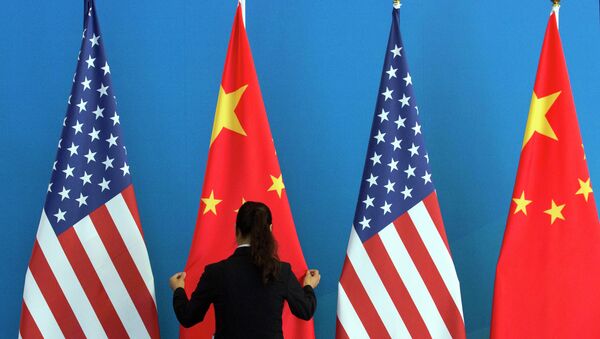Trade tensions between the United States and China escalated quickly this week, as Beijing matched the value of Chinese products the Trump administration planned to target with steep tariffs by unveiling a prospect list of US products valued at $50 billion that could face similar tariffs.
In response, Trump stepped up his hawkish rhetoric by announcing a plan to slap additional tariffs of $100 billion on Chinese products.
"In light of China's unfair retaliation, I have instructed the United States Trade Representative (USTR) to consider whether $100 billion of additional tariffs would be appropriate under section 301 and, if so, to identify the products upon which to impose such tariffs," Trump said in a statement released by the White House.
Less Domestic Pressure in China
Similar to his strategy during escalating tension on the Korean peninsula last year, when he threatened to respond to any North Korean missile attack with "fire and fury," Trump returned to his assertive tactic as he tried to force Beijing to make concessions amid escalating trade tensions between the two nations.
READ MORE: China Initiates WTO Dispute Over US Steel Tariffs — Commerce Ministry
However, unlike North Korea, which made an apparent policy U-turn earlier this year and decided to agree to peace talks, China is a completely different opponent who will not be easily manipulated and threatened, political analysts told Sputnik.
"This is very similar to his rhetoric against Kim Jong Un, when he compared whose [nuclear] button is bigger. But I think he underestimated China, which is different from other nations, because it is not a democratic country. There is no [domestic] pressure from powerful lobby groups in China. In this sense, you’ll have to face massive losses in a trade war against China," Yen Chenshen, a researcher at the Institute of International Relations, National Chengchi University in Taiwan, told Sputnik.
On the contrary, Trump could face a lot more domestic political pressure as a result of retaliatory measures from China, Yen suggested.
"If the trade war with China continues, voters in many agriculture-dependent states that supported Trump could be hurt. Take soybeans as an example, many states depend on this [exports to China]. Trump would face a lot of pressure in those states. The states that are not dependent on exports to China, such as the high-tech oriented California and Washington State, voters in those places never supported Trump in the first place," he said.
The Taiwan-based scholar pointed out that attitude in the international community is also very different on the US-China trade dispute, compared to the overwhelming support Trump received in isolating North Korea.
"This issue [trade tensions with China] is not something that Trump can unite the whole world in introducing sanctions, like he did against North Korea. While most countries in the United Nations supported economic sanctions against North Korea, those countries have zero interest in starting a trade war against China. Many countries even complained about the US policy and are against such tariffs," Yen said.
Risk-Taking Personality
Trump’s experience in the business world could have contributed to his aggressive tactics in handling foreign policy issues, Chinese political analysts explained.
Jin believes Trump’s personality demonstrated through his previous business experiences could have led to his bold comments.
"I believe it [the hawkish rhetoric] is part of his personality. Trump seems to be very stubborn. He is also not afraid of taking risks. That’s why he has bankrupted three times when doing business," he said.
The Beijing-based scholar argued that the Trump administration faces the risk of hurting US companies’ business interests in China.
"Over 40 percent of Chinese exports to the United States came from US companies’ business operations in China. Those companies licensed the products to be manufactured in China and then sold them back to the United States. This means it’s impossible for the Trump administration to target such companies. If they do, it’s almost like they decided to beat their own children, while fighting with their neighbors. That’s rather foolish," Jin said.
The expert added that it would be difficult for the Trump administration to fill the list of targeted Chinese products valued at $100 billion without hurting the interests of these US companies.
The views and opinions expressed by the contributors do not necessarily reflect those of Sputnik.


